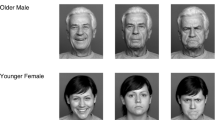Abstract
Sex and age differences in the quality and intensity of children's emotional attributions to affect-laden stories were explored. Seventy-two 7-, 9-, and 11-year-old children, with equal numbers of boys and girls of each age, were individually told 10 affect-laden stories. After each story, children were asked to indicate how they would feel as the story protagonist by pointing to angry, sad, happy, and scared faces, each of which had three degrees of intensity. The results revealed that boys attributed anger to themselves more frequently than did girls; girls attributed sadness and fear to themselves more frequently than did boys. Boys' first responses to the stories were more intensely angry and more intensely happy than were girls' first responses; and the intensity of both boys' and girls' emotional attributions decreased with age.
Similar content being viewed by others
References
Allen, J., & Haccoun, D. Sex differences in emotionality: a multidimensional approach. Human Relations 1976, 29 711–722.
Atkinson, C., & Polivy, J. Effects of delay, attack, and retaliation on state depression, and hostility. Journal of Abnormal Psychology 1976, 85 570–576.
Birnbaum, D., Nosanchuk, T., & Croll, W. Children's stereotypes about sex differences in emotionality. Sex Roles 1980, 6 435–446.
Block, J. H. Conceptions of sex role: Some cross-cultural and longitudinal perspectives. American Psychologist 1973, 28 512–526.
Borke, H. Interpersonal perceptions of young children: Egocentrism or empathy? Developmental Psychology 1971, 5 263–269.
Borke, H. The development of empathy in Chinese and American children between three and six years of age. Developmental Psychology 1973, 9 102–108.
Brody, L., & Carter, A. Childrens' emotional attributions to self vs. other: An exploration of an assumption underlying projective techniques. Journal of Consulting and Clinical Psychology 1982, 50 665–671.
Cramer, P. Defense mechanisms in adolescence. Developmental Psychology 1979, 15 476–477.
Dodge, K. Social cognition and childrens' aggressive behavior. Child Development 1980, 51 162–170.
Feshbach, N., & Roe, K. Empathy in six-and seven-year olds. Child Development 1968, 39 133–145.
Kemper, T. D. A social interactional theory of emotions. New York: Wiley, 1978.
Lewis, M., & Rosenblum, L. (Eds.), The development of affect. New York: Plenum, 1978.
Maccoby, E. E., & Jacklin, C. N. The psychology of sex differences. Stanford: Stanford University Press, 1974.
Phillips, L. A social view of psychopathology. In P. London & D. Rosenbaum, (Eds.), Foundations of abnormal psychology New York: Holt, Rinehart & Winston, 1968.
Piaget, J. Intelligence and affectivity. Palo Alto: Annual Reviews, 1981.
Romer, N., & Cherry, D. Ethnic and social class differences in children's sex-role concepts. Sex Roles 1980, 6 245–263.
Rosenkrantz, P., Vogel, S., Bee, H., Broverman, I., & Broverman, D. Sex-role stereotypes and self-concept in college students. Journal of Consulting and Clinical Psychology 1968, 32 287–295.
Walsh, J. A., Tomlinson-Keasy, C., & Klieger, D. Acquisition of the social desirability response. Genetic Psychology Monographs 1974, 89 241–272.
Author information
Authors and Affiliations
Additional information
This research was funded by a grant from the Graduate School of Boston University, #GRS-661-PS. The author expresses appreciation to the faculty and students of the Bartlett School, Lowell, Massachusetts, and to the Lowell-Lesley College Teacher Corps Project, especially to Allan Alson, John Cronin, and Edna Robinson. The author would also like to thank Shirley Brody, Emily Flynn, Benjamin Gozun, and Richard Simon for their help in various phases of this project.
Rights and permissions
About this article
Cite this article
Brody, L.R. Sex and age variations in the quality and intensity of children's emotional attributions to hypothetical situations. Sex Roles 11, 51–59 (1984). https://doi.org/10.1007/BF00287440
Issue Date:
DOI: https://doi.org/10.1007/BF00287440




